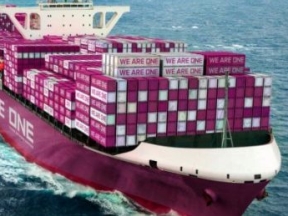London Heathrow Airport’s air cargo community has successfully completed its first trial of IATA’s ONE Record technologies, which aim to replace the legacy Cargo-Imp and XML standards. The vision for ONE Record is an end-to-end digital logistics and transport supply chain where data is easily and transparently exchanged in a digital ecosystem of air cargo stakeholders, communities and data platforms. Its objective is to address the main challenges of e-freight and unlock the possibilities of a full digital air cargo industry, creating opportunities for new value-added services and business models. Working on behalf of CCS-UK, the operator of the UK’s air cargo community system, US application development and data management specialist Nexshore built a ONE Record server based in the UK, to control the storage and transmission of the ONE Record data objects which form the core of the new concept. The server was built to the latest ONE Record standards, but was also designed to support earlier versions. In addition, security to the latest IATA specifications was built into the CCS-UK platform. “We are delighted at how well this initial pilot has gone, but we need additional participants in order to test the system on a larger scale, under everyday working conditions and with higher traffic levels,” says Malcolm Fowler, CCS-UK User Group. “ONE Record may not seem like the most important priority for the industry right now, but in fact there has never been a better time to adopt it. It delivers greater efficiency and potential cost savings, and low implementation costs. In addition, through the total transparency and uniformity it brings to the supply chain, it provides the kind of seamless data flows and visibility which shippers …
Read More »From the pages of CargoTalk: It is the time for collaboration between all the associations: Cyrus Katgara
Commenting on what is stopping the industry from keeping pace with the government and who can take the responsibility to create more awareness on going contactless, Cyrus Katgara, President, ACFI, “Associations do need to take the responsibility and we will take the responsibility. It is the time for collaboration between all the associations, be it, ACFI, ACAAI, AMTOI, CHAA, etc. ACFI has already started training programmes on how we can go contactless. It’s all about the mind-set and will power of people to avoid contact and forget our old system of interacting with people for work. We need to have interaction for every other thing except for work. Today, also at the ground level we have examination and other queries where there is contact.
Read More »IATA launches One Source for air cargo infrastructure, certification & capabilities
To help the air cargo industry in order to match the shipping needs with the availability of infrastructure capabilities and certifications of service providers across the value chain, the International Air Transport Association (IATA) has launched IATA One Source. ONE Source lists the latest operational information on airlines, airports, cargo handling facilities, freight forwarders, ground handlers, shippers, and trucking companies. All critical information contained on ONE Source has been verified by IATA to help ensure its accuracy. IATA ONE Source is free for all service providers across the air cargo supply chain. The online programme is particularly timely amid the COVID-19 crisis when shippers of medical supplies and pharmaceuticals need accurate information for time- and temperature-sensitive shipments. “Air cargo has been essential in the global fight against COVID-19, transporting vital equipment and medicines to those who need them most. However, with over 3,500 differently sized cargo handling facilities worldwide, the industry until now has lacked visibility on the capacities and services these facilities can offer. The need for greater transparency is even more critical in the current context. ONE Source addresses this by providing a single reference point for up-to-date infrastructure and certification data, helping save time and keep air cargo moving,” said Glyn Hughes, Global Head of Cargo, IATA.
Read More »ONE India goes live for ‘electronic delivery order’ on PCS1x at Nhava Sheva
ONE India (Ocean Network Express) became the first Carrier to launch their Electronic Delivery Order (e-DO) via Port Community System (PCS1x) by going live for Nhava Shiva India. While urging all other carriers to step forth and commence eDO release via PCS1x, Dr Janardana Rao, MD, IPA (Indian Ports Association), says, “This initiative will significantly improve efficiency while also taking Indian logistics closer to becoming a paperless regime. With the roll-out of the service, ONE India customers will be further facilitated and gain considerably; saving time and money in clearing cargo and speed up delivery order extension and the empty offload processes. Field agents of importers and customs brokers need not wait at line offices and can be utilised more productively. Indian Ports Association (IPA) launched a value-added Electronic Delivery Order (eDO) facility – on its cloud based new generation Port Community System ‘PCS1x’. Government has ensured that the facility can be availed free of charge by all stakeholders on PCS1x.
Read More »TCS partners with TPT South Africa to build an online logistics marketplace
Tata Consultancy Services (TCS) has partnered with Transnet Port Terminals (TPT) in South Africa, a state-owned freight transport and handling company, to develop an integrated online marketplace platform by bringing together cargo owners, shipping lines, clearing and forwarding agents, and road/rail haulers. Both the companies aim to create a platform named Cargo Connect, which will function as an online logistics marketplace where customers can submit logistics related requests and allow service providers to bid online. Customers will be able to select the preferred proposal and award the cargo contract to that bidder. Expected to be ready in 12 months, the Cargo Connect marketplace will reshape the industry and drive TPT’s growth. Sharla Chetty, Chief Information Officer, TPT, says, “A major feature of this solution is a logistics marketplace which will function in the same manner as existing market platforms in the transportation and hospitality industry. Customers could tender logistics requests on the platform and allow logistics service providers to bid and potentially be selected to undertake a logistics service.” Siyabulela Mhlaluka, General Manager, Sales and New Business Development, TPT, said, “The new solution will help us bring all logistics players under one platform, create transparency in the industry, as well us power the next leg of our growth journey.” “TCS has been partnering with progressive organizations across the world to develop new technology-enabled business models that power their growth and transformation journeys,” said Sumanta Roy, Head, TCS Middle East, Africa, and Mediterranean.
Read More »CEVA Logistics rollout CargoWise across global network to simplify operational process
CEVA Logistics has commenced the rollout of CargoWise, the integrated logistics execution platform, in order to simplify and standardise all 4PL operational processes across its global network. CargoWise will be implemented over the course of the next five years, as part of a planned process, replacing multiple legacy systems and delivering greater efficiency within the business. The switch to CargoWise will enable the company to have real-time visibility of freight forwarding and Customs actions on a single platform. As a purpose-built solution, Cargowise gives employees access to the same information in a single database across all functions, offices, countries and languages, furthering the CEVA Logistics digital transformation. By the end of 2022, 50 per cent of all CEVA Logistics locations will be fully operational on the CargoWise platform with the whole project completed and deployed by 2025. “By implementing CargoWise, CEVA Logistics will further improve productivity and efficiency as we strive to lead the way in multi-modal forwarding and contract logistics operations. CargoWise is the right choice to provide this new digital platform. CEVA Logistics recently invested to improve the customer journey and this implementation allows us to develop a high-level employee journey as well,” says Mathieu Friedberg, CEO, CEVA Logistics. Richard White, Global Founder and CEO, WiseTech, said, “The world of logistics has experienced significant upheaval over the past six months with the digitisation and automation of processes critical for future success. CargoWise will empower and enable CEVA Logistics to significantly improve efficiencies across its logistics and supply chain operations and continue to build its presence and strength globally.” Licensed across 160 countries, CargoWise enables logistics service providers to execute highly complex transactions in areas such as freight forwarding, …
Read More »From the pages of Cargotalk: Aggregation models should be strengthened to bring efficiency: Aditya Shah
Commenting on the aggregation model where truck owners are connected by the goods supplier, Aditya Shah, Executive Director, V-Trans India emphasised, “A lot of attempts have been made whether through private players or associations. To bring in efficiency, aggregation models should be strengthened, and they must be accessible to everyone, be it a truck aggregator or direct consumer. However, since the volume is so huge, probably one aggregating platform may not be able to sustain. It is only possible if three to four players merge, whether it is private or government, in order to make the truck seamlessly available to everyone. So, the data would be available but it is more about how easily we are able to access it with the use of technology and get the vehicle wherever you required it.”
Read More »From the pages of CargoTalk: COVID-19 crisis will take cargo industry to a new level: Amar More
According to Amar More, CEO, Kale Logistics Solutions, “If we leverage this opportunity, we will be at a different level of automation and this has happened in the past as well. After the 9/11 incident, most of the electronic communications got a major boost when US customs and border protections wanted information in advance. Our industry woke up and suddenly there was EDI flowing all around. Then the Yemen incident happened, and then there is big rush on providing a date before the aircraft is loaded. This kind of crisis has always created the pleading ground for higher technology adoption, and I am extremely confident it will take our industry, especially India to a new level,” he added
Read More »From the pages of CargoTalk: Pandemic led us to leverage the existing technologies: Saurabh Kumar
Calling pandemic an opportunity for us to look at digitisation seriously, Saurabh Kumar, CEO, Hyderabad Air Cargo, says, “We started challenging ourselves to process the same amount of cargo with minimal number of people. The pandemic has led us to challenge the existing way and leverage all the existing technologies. The busiest people in the industry are the people who are giving solutions to the emerging needs. The pandemic has set a clear roadmap in front of airports and air cargo complexes to become more sustainable and resilient in the future in case of any such pandemic.”
Read More »Adani Ports goes live with Port Community System (PCS1x)
Portall announced that Adani Ports and Special Economic Zone (APSEZ) has joined the maritime trade digitalisation platform, run by the government, Port Community System (PCS1x) to promote ease of doing business. The move comes as more ports, container freight stations (CFS) and inland container depots (ICD) move entirely to the application programming interface (API) on PCS1x that enables instant data exchange with zero loss, encompassing 17 messages which cover all the operational requirements of the port and its stakeholders. NMPT, New Mangalore Port Trust is also close to go live with API shortly. “The benefits of such real time connectivity are open to all custodians, all carriers and all ports and terminals. More and More stakeholders are approaching us for API and we have our technical partners Portall deployed on the job daily to assist and facilitate. The API Integrations have not only helped the Ports, CFS and ICDs to share and distribute data more efficiently, but also to customize data sets and enrich user experience via PCS1x.” said Dr. Janardana Rao, MD, IPA. Jawaharlal Nehru Port Trust (JNPT) has also completed its API integration with Port Community System (PCS 1x) with 17 API messages which cover all the operational requirements of the port and its stakeholders. With this go-live, JNPT and PCS1x have ensured the future road map for API integration is set for other ports who are already testing with PCS 1x for API Integration. The Port handles about 200 vessels a month and has been at the forefront of tech adoption in the country. This enhancement will bring real time experience for data availability and acknowledgements in case of errors while message transmissions.
Read More » Cargo Breaking News
Cargo Breaking News









